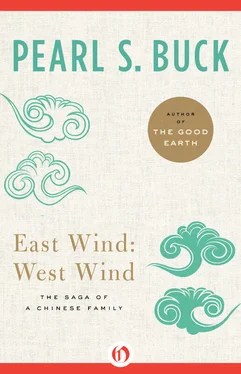“Is our mother no longer our mother, then, since we have a republic?”
But he was impatient and vexed with everything and heard nothing that was said to him.
Although I must be just to the foreigner. She had not really objected to bowing before his mother. I am told she said only this,
“If it is your custom, of course I will do it, although I think it a little foolish, perhaps, to bow like that before anyone!”
She was calm, far calmer than my brother, and more confident of the future. She thought always of him and of how to win him back to happiness. Sometimes when she saw him angry she coaxed him away out into the garden or beyond the gate.
Once I looked at them out of the window, and I saw them there in the garden. She was talking to him earnestly, and at last when he still did not answer her, but continued to look gloomily at the ground, she drew her hand gently along his cheek and gazed at him, half-smiling, half-wistful. I do not know what she said to him when they were alone like this, but afterwards my brother was better for a little while and more quiet, although he never eased his tension of waiting.
But she did not always coax him thus. Sometimes she shook her shoulders lightly in the way she had, and let him be alone. Only her eyes followed him with the deep look they have whenever she gazes at him. If he did not come to her then, she withdrew herself and spent the time in learning our language and in playing with my son, whom she loves and speaks to in words I cannot understand.
She has even begun to learn from me also something of the music of the ancient harp, and soon she knew enough to make an accompaniment to her songs. Her voice when she sings is full and moving in its depth, although to our ears, accustomed to the delicate, high notes of the human voice, it has a quality of sweet harshness. She can melt my brother to instant passion with her singing. I cannot understand the songs, but when I hear her I feel a dark vague pain.
At last when no message yet came from my mother, she seemed to cease to think of the matter and turned her mind to other things. She went daily for long walkings by herself or with my brother. I marveled that my brother ever allowed her to go alone, since it is certainly not seemly in a woman, but he said nothing, and she returned full of talk about the streets, wondering at sights which others would not notice and seeing beauty in strange places. I remember one day she came back smiling her quick smile, as though she had some inner amusement which others had not, and when my brother asked her concerning it she said, in her own language and he afterwards told it to us,
“I have seen the beauty of the earth when it has put forth grain. In the grain shop in the main street they have placed in little brown wicker baskets the loveliest colors of grains — yellow corn, red beans, dried gray peas, ivory sesame, pale honey-colored soy-beans, ruddy wheat, green beans — I never can pass them quickly. What a pastel I might make if I could dip a pencil into them!”
I could not understand what she meant altogether, but she is like that; she lives within herself, seeing beauty where others cannot. I had not thought of a grain-shop thus. It is true that the grains there are many-colored, but so it is by nature. No one has made the grains different. There is nothing to wonder at — it has always been thus. To us a grain-shop is only a place to buy food.
But she sees everything with strange eyes, although she seldom comments on anything, only asking questions and storing our answers away into her thoughts.
Living with her day after day, I have grown to like her, and as I watch her, there are times when I even see something of beauty in her strange looks and ways. Certainly she has a great pride of a kind. She is wholly frank and unconstrained in her bearing. Even to my brother, her husband, she is never humble. The strangest thing of all is that whereas in a Chinese woman he would not endure this, in her he seems to find it a delight, bearing the sting of a pain, so that he is ever more enamored of her. When he sees her too long diverted by her study or her reading, or even by my son, he becomes restless and glances at her now and again and speaks to her, and at last if she does not heed him, he gives over his brooding and comes to her side, and she possesses him afresh. It is like nothing I have ever seen, this love between them.
But there came a day at last — I think it was the twenty-second after the presentation, when my mother sent for my brother, desiring him to come alone to her. The letter was kindly worded, even to gentleness, and we were all hopeful therefore, and my brother went immediately, and I waited with the foreigner for his return.
In an hour he was back! He strode into the front door and into the room where we sat. He was angry and his face was sullen, and he kept saying over and over that he would separate himself from his parents forever. At first we could get nothing ordered from his speech, but later, piecing this to that, we found something of the truth.
It seems he had gone before his mother full of tenderness and conciliation. But he said from the very first she was willing to concede nothing. She began by stressing her ill health.
“It is not long before the gods will remove me to another circle of existence,” she said, and he was touched.
“Do not say that, my mother!” he begged of her. “You have a life yet to live in your grandchildren.”
Instantly he regretted that he had given her the thought.
“Grandchildren?” she repeated quietly. “Ah, my son, from whence shall any grandchildren for me come, except from your loins? And the daughter of Li, my daughter-in-law, still waits, a virgin!”
Then without further polite speech she spoke plainly and urged him to marry his betrothed and give her a grandson before she died. He said then that he was already married. She said in anger to this that she would never accept the foreigner as his wife.
This much we have gathered together from what he says. I do not know what more passed between them.
But Wang Da Ma, the faithful servant, says that she listened at the curtain, and that within a twist of the hand hot speech was flying back and forth, unseemly speech, between mother and son. It was like quick thunder crackling across the sky. She says my brother did indeed show patience until my mother threatened to have him disinherited from the family, and then he said bitterly,
“And will the gods give you another son, then, that you should throw this one away? Will they again enrich your womb at such an age? Or will you stoop to take the son of a concubine for your son?”
Unseemly words from a son, indeed!
Then he flung himself out of the doorway and rushed forth through the courtyards, cursing his own ancestors. There was a great silence within my mother’s room, and then Wang Da Ma heard a moaning. It was my mother. Wang Da Ma entered in great haste. But my mother was instantly silent then and biting her lips merely bade the servant feebly to help her to her bed.
It is shameful that my brother should have spoken thus to his mother! I do not excuse him for any cause. He should have remembered her age and her position. He thinks only of himself.
Oh, sometimes I hate the foreigner because she holds utterly in the palm of her hand my brother’s heart! I longed to go at once to my mother, but my brother begged me to await her summons. My husband also commanded me to wait, since if I went it would seem to be against my brother, and now that he is eating our rice, this would be discourteous. I had therefore no recourse except in patience — poor food for an anxious heart, My Sister!
And thus matters remain with us.
Yesterday I was glad when Mrs. Liu came to see us. We had spent a difficult day, remembering the day before when my mother had been angered with my brother, so that their meeting bore no fruit except disappointment. My brother had hung about the rooms, scarcely speaking to anyone, and staring out of the window. If he picked up a book to read it, he threw it down quickly and chose another, only to put that away as quickly.
Читать дальше











